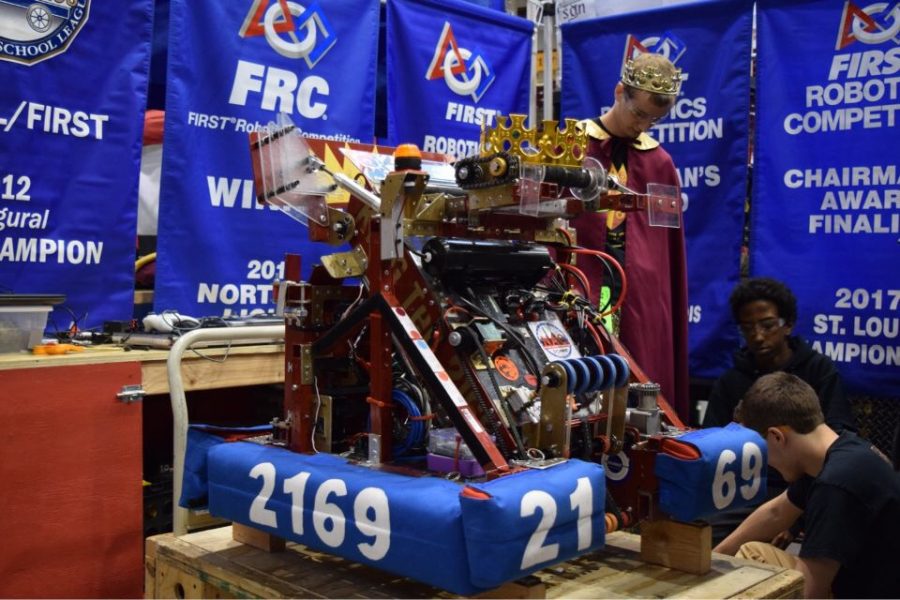Prior Lake’s robotics program made possible by student and parent mentors
The Prior Lake Savage school district is very well known for having an incredible robotics program that starts in kindergarten with the FLL program, and ends in high school with the FTC and FRC programs. But what makes the program so successful?
Many high schools throughout the Twin Cities struggle to form robotics teams strong enough to compete in tournaments. Meanwhile, Prior Lake consists of a multitude of teams competing in tournaments regularly under programs such as FTC and FRC that are promoted to elementary and middle school students before they are even able to participate.
A majority of the success that comes from these robotics programs is made possible by all of the student and parent mentors working behind the scenes and with the robotics teams to make the program thrive. Without the help of the mentors, the Prior Lake robotics teams would not be as prepared and organized, the learning process would not be as engaging, and robotics would not be as promoted in Prior Lake.
The largest of these robotics programs, First Tech Challenge, or FTC, offers high school students a fascinating way to cultivate engineering and business talents. The students accomplish this by building robots for various competitions throughout the robotics season, which starts September 9th with the FTC kickoff, and ends April 29th with last robotics competition, known as the World’s Competition.
Students in the FTC program form various teams and work together to build a specialized robot to compete in the yearly game, which differs each robotics season. Each team member is assigned a different role and department they are a part of, such as programming, engineering, project management, designing, or even business and advertising.
The program requires cutting-edge curriculum, a plethora of preparation, and intuitive instruction to allow the students to succeed as much as they do currently in the Prior Lake robotics program. On top of that, the robotics program itself is very intricate in how it runs. “The program is structured as a business would be. There are considerations for immediate needs, growth, and long term sustainability. Sustainability both financially and with personnel,” adult FTC mentor Mike Kapsch said.
That is where the mentors play a key role in the development of the FTC robotics teams. The mentors involved in the program are very experienced and are often former FTC students or parents of the students. These mentors provide the support, organization, instruction, and experience needed for a successful robotics team.
As Kapsch said, “Mentors of all kinds are beneficial for the program. Every mentor provides for the students their own life experiences, maturity and advice.” They provide “skills such as philanthropy, communication, management, leadership, organization, marketing, media, project management, and technical skills such as engineering and programming.”
The FTC mentors do everything from introducing the yearly game to the students during the FTC kickoff to helping them manage the business aspect of the team. They teach the curriculum to students, strategize with them, plan tournament trips, organize fundraising events, manage consent forms and tournament registration, promote the program to future FTC students, and, most importantly, the FTC mentors try their best to make the program engaging and beneficial for their students.
Like many other parent mentors, Kapsch realized that his skills would be of great benefits to his child’s robotics team. Even after his child graduated high school and moved on from robotics, Kapsch kept mentoring FTC teams and was even hired last year by the Prior Lake Savage district as an official mentor.
As he stated, “I recognized the value that the program brings to the students. It helps students develop their own skills in many valuable areas.” He saw the impact the program had on his child, who is now dual majoring in engineering and mathematics, and wanted to help other students benefit in the same way.
While most of the adult mentors get involved in FTC through their children, student mentors often get involved with the program because they were a part of it themselves at some point in high school. Matthew Zwinger, a former FTC student, joined the Prior Lake robotics program in 7th grade and became a mentor in 9th grade. By the time Zwinger reached 10th grade, he officially became an FTC mentor. Now, in 12th grade, he holds the title of lead FTC mentor and coordinator.
Zwinger decided to become a student mentor and FTC lead because his position will benefit his resume immensely and because he wants to help FTC teams succeed. He understands that with mentor support, FTC helps students gain experience for internships and careers. As Zwinger said, out of all the students who first start FTC, only one third of these students know the basics to building robots. Mentors like Zwinger and Kapsch are needed to start students on the right track and guide them to benefit from everything the FTC program has to offer.
The student and adult mentors of the program invest hours and hours into their FTC students. They work out all of the details, offer much needed instruction, and coordinate all of the events to support the students in learning and having fun. Their only goal in mind is to pave the path to success for the FTC robotics members. They want their students to succeed not only to win tournaments, but also to gain life experiences, engineering ability, business skills, and social etiquette that will help them through college and beyond into their careers.
“Ninety percent of students who were a part of the robotics program wind up in STEM related fields in college,” Kasph said. The Prior Lake FTC robotics teaches lifelong engineering skills that provide students direction for college and personal application for their careers after. As Zwinger stated, “Robotics is a lot more than building a robot. It is learning real world experiences that will help them in the future.”








